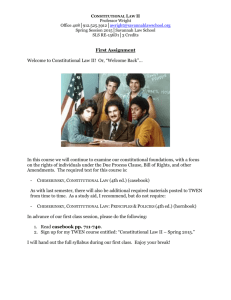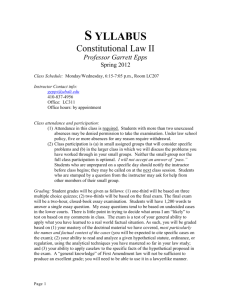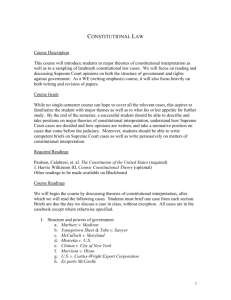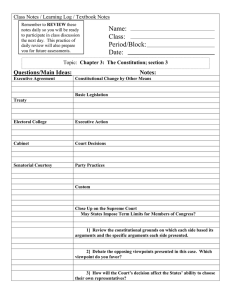CONSTITUTIONAL LAW
advertisement
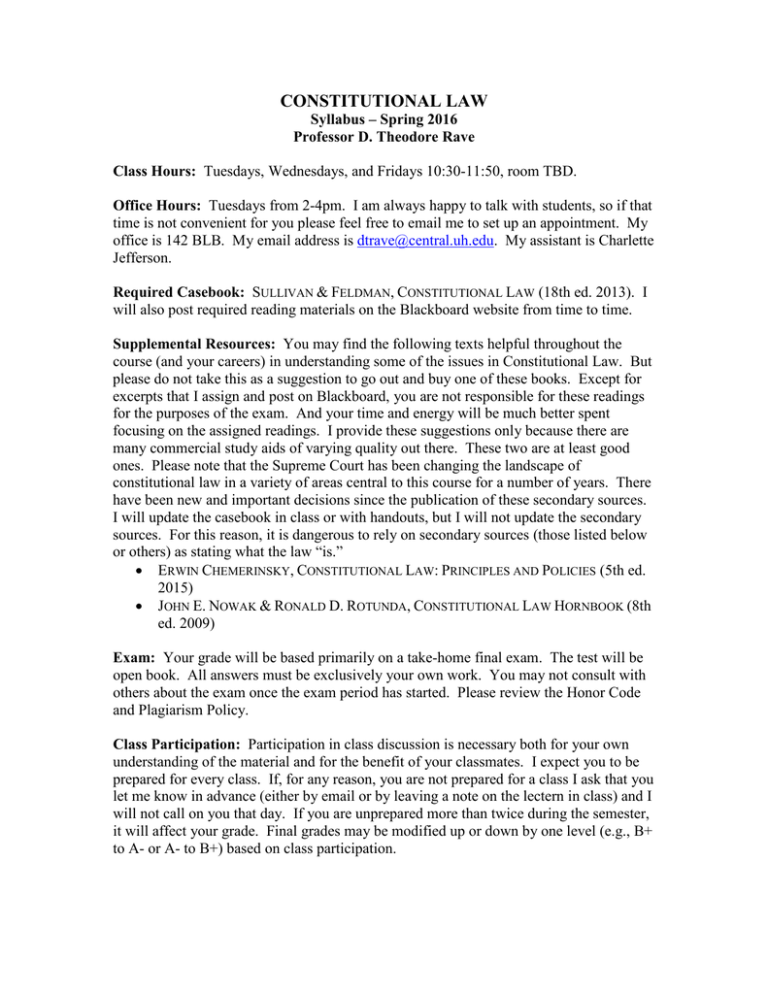
CONSTITUTIONAL LAW Syllabus – Spring 2016 Professor D. Theodore Rave Class Hours: Tuesdays, Wednesdays, and Fridays 10:30-11:50, room TBD. Office Hours: Tuesdays from 2-4pm. I am always happy to talk with students, so if that time is not convenient for you please feel free to email me to set up an appointment. My office is 142 BLB. My email address is dtrave@central.uh.edu. My assistant is Charlette Jefferson. Required Casebook: SULLIVAN & FELDMAN, CONSTITUTIONAL LAW (18th ed. 2013). I will also post required reading materials on the Blackboard website from time to time. Supplemental Resources: You may find the following texts helpful throughout the course (and your careers) in understanding some of the issues in Constitutional Law. But please do not take this as a suggestion to go out and buy one of these books. Except for excerpts that I assign and post on Blackboard, you are not responsible for these readings for the purposes of the exam. And your time and energy will be much better spent focusing on the assigned readings. I provide these suggestions only because there are many commercial study aids of varying quality out there. These two are at least good ones. Please note that the Supreme Court has been changing the landscape of constitutional law in a variety of areas central to this course for a number of years. There have been new and important decisions since the publication of these secondary sources. I will update the casebook in class or with handouts, but I will not update the secondary sources. For this reason, it is dangerous to rely on secondary sources (those listed below or others) as stating what the law “is.” • ERWIN CHEMERINSKY, CONSTITUTIONAL LAW: PRINCIPLES AND POLICIES (5th ed. 2015) • JOHN E. NOWAK & RONALD D. ROTUNDA, CONSTITUTIONAL LAW HORNBOOK (8th ed. 2009) Exam: Your grade will be based primarily on a take-home final exam. The test will be open book. All answers must be exclusively your own work. You may not consult with others about the exam once the exam period has started. Please review the Honor Code and Plagiarism Policy. Class Participation: Participation in class discussion is necessary both for your own understanding of the material and for the benefit of your classmates. I expect you to be prepared for every class. If, for any reason, you are not prepared for a class I ask that you let me know in advance (either by email or by leaving a note on the lectern in class) and I will not call on you that day. If you are unprepared more than twice during the semester, it will affect your grade. Final grades may be modified up or down by one level (e.g., B+ to A- or A- to B+) based on class participation. Practice Problems: There will be several practice problems throughout the semester. You will be required to complete and turn in answers. These will not be graded, but will count towards class participation. All students that make a good faith effort to complete the practice problems will satisfy this requirement for class participation purposes. Please keep in mind that your final grade can be modified up or down for class participation. Attendance: You are expected to attend all class sessions. If you fail to attend at least 80% of class meetings you will be in violation of ABA and Law Center policy and may be dropped from the course. I will keep track of attendance by passing around a sign-in sheet. It is an honor code violation to sign in for another student. Late arrivals may be treated as absences. Computer Policy: Use of laptops or other electronic devices is permitted for classrelated purposes only. Violations of this policy will be treated as unpreparedness. Sensitive Topics: More than any other course in the first year of law school, Constitutional Law deals with sensitive topics about which people have strongly held and widely divergent opinions. I find that class discussion is the most productive when students feel free to try out positions with which they (or others) may not agree and to test the assumptions underlying their own (or others’) views. For this reason, class discussion is strictly “off the record.” Outside of the classroom, you may not attribute any statements made in class to any of your classmates. And any audio or visual recording of class is prohibited. They only exception to this policy is that I will arrange for the law school to record any make-up classes that might become necessary. Accommodation: If you have a disability and require an accommodation, please contact the Center for Students with Disabilities. Reading Assignments: Reading assignments will be announced in class or emailed to all class members. I will provide you with a course outline and reading assignments in installments as the semester goes on. Unless otherwise noted, page numbers refer to the Sullivan & Feldman casebook. (BB) refers to supplemental readings posted on Blackboard. First Assignment: For the first class, please read the Constitution of the United States of America in the casebook and the Bobbitt and Stewart excerpts posted on Blackboard. Course Outline (Part 1) I. What is a Constitution? (And a Review of Eighth Grade Civics) Constitution of the United States of America, pp. lxv - lxxix Phillip Bobbitt, The Modalities of Constitutional Argument (BB) Jon Stewart, America (the book), Ch. 2 (BB) II. Judicial Power A. Judicial Review B. Judicial Supremacy and the Countermajoritarian Difficulty C. Constraints on the Judicial Power III. Federalism and Congressional Power A. Principles of Federalism B. Congressional Power 1. Commerce Power 2. Taxing and Spending Powers 3. Tenth Amendment Limits on Congress’s Power Over the States C. Constitutional Limitations on State Power IV. Executive Power A. The (Non)Prosecution Power B. Emergency and Wartime Powers V. State Action and Incorporation A. The Reconstruction Amendments B. Incorporation of the Bill of Rights C. State Action VI. Substantive Due Process A. Economic Liberties B. Privacy VII. Equal Protection A. Equal Protection Methodology B. Rational Basis Review of Economic Regulation C. Heighted Scrutiny of Suspect Classifications D. Fundamental Interests Equal Protection VIII. Congress’s Power to Enforce the Reconstruction Amendments and the Contest for Constitutional Supremacy
